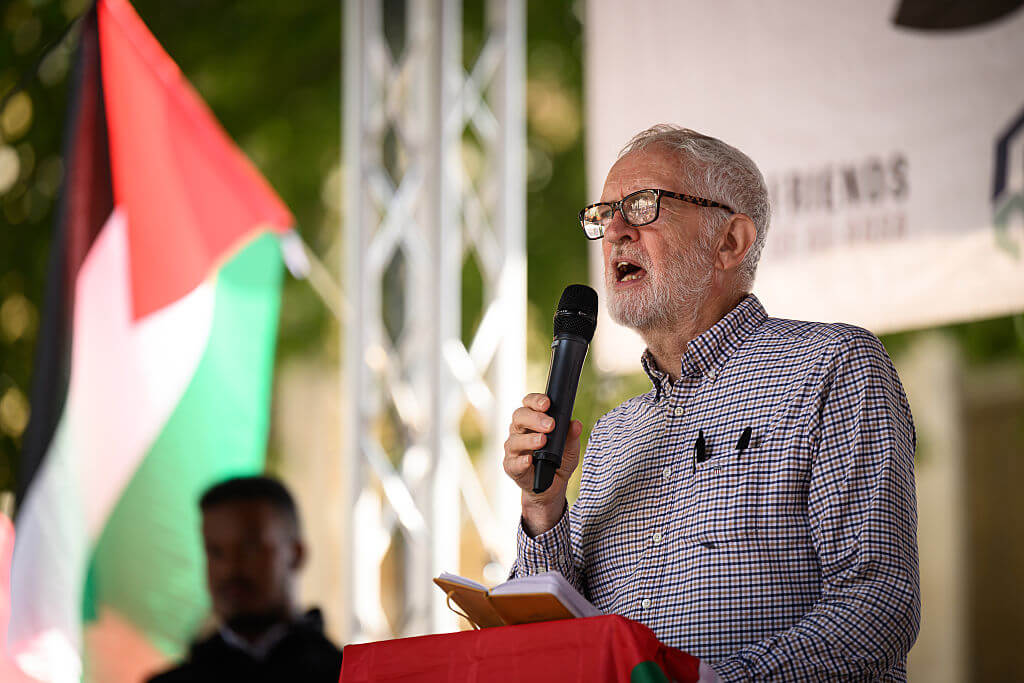Why Jeremy Corbyn’s support for Zohran Mamdani is fueling antisemitism fears
Corbyn was expelled from the Labour Party over antisemitism accusations

Former Labour Party leader Jeremy Corbyn addresses attendees at the National March for Palestine on July 19, 2025 in London. Photo by Leon Neal/Getty Images
Jeremy Corbyn, the former British Labour leader ousted from his party over accusations of antisemitism, joined a phone bank for New York City mayoral candidate Zohran Mamdani on Sunday. Corbyn’s participation quickly drew backlash.
Mamdani “will ensure that the world doesn’t pass by on the other side while the terrible genocide goes on in Gaza, which has been so terrible for the Palestinian people,” Corbyn said on the Zoom call, according to audio reviewed by the Forward.
Critics said Corbyn’s role on the call, organized by the Democratic Socialists of America’s New York City chapter, confirmed what they see as Mamdani’s alliances with antisemites — at a moment when the Democratic frontrunner is trying to reassure Jewish New Yorkers ahead of Tuesday’s election. Mamdani has at once struggled to earn the trust of many Jewish New Yorkers and built a broad base of Jewish support.
“Having Jeremy Corbyn — someone whose party was found to have committed unlawful acts of discrimination against Jewish people under his leadership — phone-banking for @ZohranKMamdani says everything you need to know,” Andrew Cuomo, who is running in the mayoral election as an independent, posted to X. “New York doesn’t need politics of moral compromise. We need leadership that rejects antisemitism, extremism, and division in every form and in every corner.”
“You. Can’t. Make. It. Up.,” said Jonathan Greenblatt, CEO of the Anti-Defamation League, who has previously clashed with Mamdani over his views on Israel and whether the ADL represents the views of New York Jews.
What are the antisemitism allegations against Corbyn?
Corbyn, a British politician known for his far-left politics and pro-Palestinian activism, drew scrutiny in 2015 for referring to representatives of Hamas and Hezbollah as his “friends” in the context of peace talks in 2009. He later said he regretted the phrasing.
Further controversy erupted in 2018 after reports surfaced that, in 2012, Corbyn had commented approvingly on a Facebook post featuring a mural depicting caricatured Jewish bankers with hooked noses playing Monopoly. He later said he should have “looked more closely at the image” before posting his support.
That same year, Corbyn became a central figure in a debate over whether the Labour Party should adopt the International Holocaust Remembrance Alliance’s definition of antisemitism, which classifies most expressions of anti-Zionism as antisemitic. Corbyn argued the definition could restrict legitimate criticism of Israel.
Corbyn introduced an amendment to clarify that “it cannot be considered racist to treat Israel like any other state or assess its conduct against the standards of international law.” That addition did not pass, and Labour adopted the IHRA definition.
Allegations of antisemitism within Labour escalated in 2019, when the Equality and Human Rights Commission found the party had committed “unlawful acts of harassment and discrimination” against Jews under Corbyn’s leadership and failed to properly investigate complaints. Corbyn rejected the findings as politically motivated.
“One antisemite is one too many,” he said at the time, “but the scale of the problem was also dramatically overstated for political reasons by our opponents inside and outside the party, as well as by much of the media.”
The Labour Party suspended Corbyn in 2020 after those remarks. He was reinstated three weeks later after walking back those comments, saying that concerns about antisemitism were “neither ‘exaggerated’ nor ‘overstated.’”
But last year, Corbyn was expelled from the Labour Party on the same basis, with Prime Minister Keir Starmer — whose wife and children are Jewish — telling Sky News he wanted to “tear antisemitism out of our party by the roots.”
On Sunday’s phone banking call, Corbyn said he was “very excited” by Mamdani’s campaign, describing the mayoral candidate as “a voice for justice around the world.”
Corbyn told volunteers he had spoken at 32 national pro-Palestinian demonstrations since October 2023 and would keep protesting “for as long as it takes to bring about justice for the Palestinian people.” That, he added, included ending arms shipments to Israel and halting the Royal Air Force’s cooperation with the Israeli military.
“So there’s so much that we can work together on,” Corbyn said.
Corbyn also said he had sent Mamdani two gifts: a book called Poetry for the Many, a poetry anthology co-authored by Corbyn; and an Arsenal shirt for the fellow soccer fan.
“I look forward to meeting Mayor Zohran, and when he comes over here, we’ll go to an Arsenal game,” Corbyn said, later adding, “I’ll be staying up very, very late on Tuesday night to hear the results.”
Mamdani, the DSA, and antisemitism
Mamdani’s positions on Israel have roiled Jews across the country, and he’s often had to defend himself against allegations of antisemitism for: refusing to outright condemn the slogan “globalize the intifada;” reiterating support for Palestinians in his statement on the Gaza ceasefire; vowing to arrest Israeli Prime Minister Benjamin Netanyahu if he visits New York; and saying he doesn’t recognize Israel as a Jewish state.
Mamdani has also been criticized for his affiliation with the DSA, a socialist political organizing group that describes itself as anti-Zionist and endorses the Boycott, Divestment and Sanctions movement. Mamdani has said that pro-Palestinian activism and his commitment to BDS was “the crux of the reason” why he joined DSA in 2017.
But as the DSA has taken an increasingly hard line on Israel, it has found itself at odds with even progressive politicians.
Last year, New York Rep. Alexandria Ocasio-Cortez lost the DSA’s endorsement over her position on Israel. The DSA took issue with Ocasio-Cortez hosting an online panel discussion with two leading Jewish experts on antisemitism, and for voting in favor of a resolution that condemned Hamas and equated the denial of Israel’s right to exist with antisemitism.
In August, the national DSA passed a resolution that said “making statements that ‘Israel has a right to defend itself’” and “endorsing statements equating anti-Zionism with antisemitism,” would be considered an expellable offense.
The DSA’s New York City chapter, of which Mamdani is a member, faced broad condemnation for celebrating the attacks of Oct. 7 at a demonstration in Times Square on Oct. 8. Mamdani has distanced himself from that rhetoric, condemning the Oct. 7 attack by Hamas as a “horrific war crime” and describing the celebration of the killing of civilians by some of the rally’s attendees as “not befitting of a movement supporting universal human rights.”
He has also sought to distance himself from aspects of the DSA’s national agenda, telling The New York Times that the group’s platform was not the same as his.

















